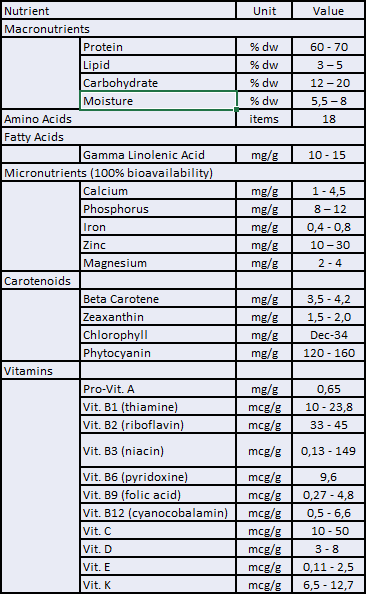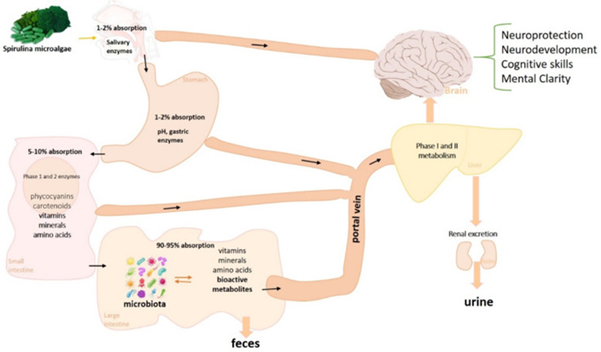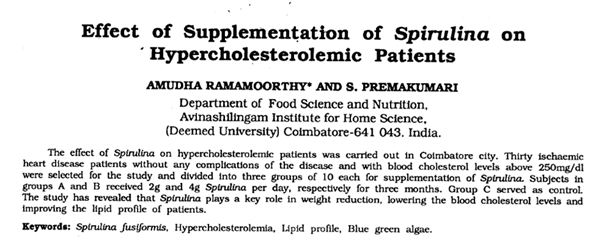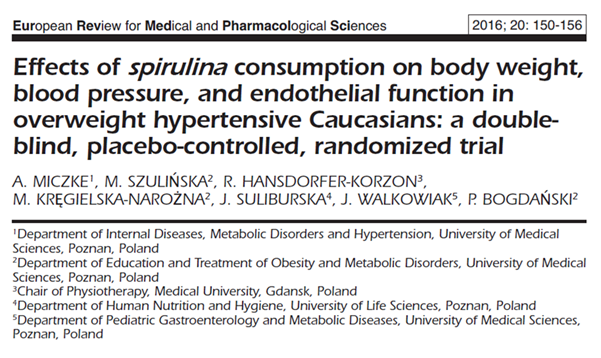In this fast-paced modern age, most people care more about ‘have I eaten?’ and less about ‘what I ate’. This leads to nutrition imbalance and eventually health problems. Those people will then consider these health problems as ‘illness’ and treat it with medicine, which are often times caused by lack of certain nutrients in their body.
And then came the supplement industry. Vitamins, minerals, even instant protein packed as in convenient forms to consume. In case you didn’t know, this industry boomed.
Our nature actually made something which contain almost all necessary nutrients our body needs. You guessed it, spirulina. According to Wikipedia, Spirulina is the dried biomass of cyanobacteria (blue-green algae) that can be consumed by humans and animals. Why eat this, you might ask. Let’s take a look at its nutrient profile.
More comprehensive list: USDA
Now go check that list again. It listed something called ‘Carotenoids’. What is it? Well, the simplest explanation is, Carotenoids are a class of pigments synthesized by plants, algae, and some bacteria. They are responsible for the vibrant colours of many fruits, vegetables, and flowers. Okay, so carotenoids are pigments, but why would it be listed as one of the nutrients? Here’s what made it interesting. In human body, carotenoids act as antioxidants, which help protect cells from damage caused by free radicals. Some carotenoids, like beta-carotene, can be converted into vitamin A in the body, which is essential for vision, immune function, and cell growth.
I found a study done by a group of Indonesian researchers about how much carotenoids people actually consume each day. According to their study, the average person consumes 6,5 – 8,6 mg/day. Meanwhile WHO recommends 9 – 17 mg/day. Translating these numbers into grams of fruits and vegetables, only 247,1 g/person/day, WHO recommends 400g/person/day. Let’s face it, how many of us consumes 400 grams of fruits and vegetables every day? Based on this study alone, no wonder the number of people with ailments is on a steady increase.
Need more scientific evidence that consuming spirulina is beneficial? Say no more.
“Spirulina microalgae contain a plethora of nutrient and non-nutrient molecules providing brain health benefits. Numerous in vivo evidence has provided support for the brain health potential of spirulina, highlighting antioxidant, anti-inflammatory, and neuroprotective mechanisms. Preliminary clinical studies have also suggested that spirulina can help to reduce mental fatigue, protect the vascular wall of brain vessels from endothelial damage and regulate internal pressure, thus contributing to the prevention and/or mitigating of cerebrovascular conditions. Furthermore, the use of spirulina in malnourished children appears to ameliorate motor, language, and cognitive skills, suggesting a reinforcing role in developmental mechanisms. Evidence of the central effect of spirulina on appetite regulation has also been shown. This review aims to understand the applicative potential of spirulina microalgae in the prevention and mitigation of brain disorders, highlighting the nutritional value of this “superfood”, and providing the current knowledge on relevant molecular mechanisms in the brain associated with its dietary introduction.”
Will it benefit people with diabetes type 2? This study confirms it. 2 grams of daily intake for 60 days has been observed to decrease blood sugar level.
What about atheroma? Atheroma is the narrowing of blood vessels caused by deposits of LDL, VLDL, and triglycerides. People who suffers from atheroma is almost guarantee to catch heart disease and stroke. Fear not, I found a study which says ‘yes, it helps’
The study was conducted on overweighed individuals (40 – 60 years old). The researchers concluded that consuming 2 – 4 grams of spirulina daily for 90 days has been observed to reduce ‘bad’ cholesterol, thus reducing the risk of atheroma. Spirulina contains linolenic acid which prevent deposits of fat and cholesterol in blood vessels. Moreover L-phenylalanine and L-tyrosine in spirulina will affect norepinephrine and dopamine in the brain, thus reducing appetite. Sounds like a good deal for those struggling with weight loss.
Another related study concluded that daily spirulina intake of 2 grams for 90 days has been observed to significantly reduce systolic pressure (from heart to whole body)
Not only spirulina could help with existing illness, it also helps with child stunting. A randomized trial in Zambia has shown that daily supplementation of 10 grams for 12 months towards 6-18 months old babies has shown improvement in motoric development, as well as overall immunity.
In conclusion, our modern society has been suffering from illnesses caused by the lack of nutrition. One of the cheapest methods to address these illnesses is to give our body the nutrition it needs. What do you think? Interested in incorporation spirulina into your diet?






